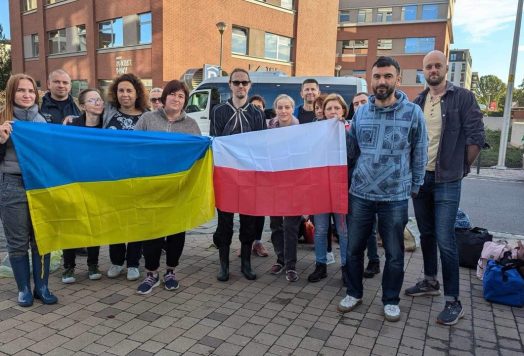Culture as one of the fundamental determinants of human reality has a big impact on the process of adaptation of migrants. Dr. Margaret Ohia-Nowak, an expert in intercultural communication, will talk about the importance of cultural differences, about several of the most important cultural features of Poland and adaptation in the Polish cultural environment.
What aspects of culture should you consider if you are new in Poland? Why are Poles seen as too emotional and talkative on the one hand but reserved and reticent on the other? Why countries with geographical and historical proximity, and the linguistic and cultural similarity may culturally differ from each other? Why do several expressions or gestures convey the opposite meaning in different cultures (for example avoiding eye contact, expression of respect in Asia and Africa, stands as a manifestation of insincerity and malicious scheming in Poland)?
Cultural adaptation and cultural differences
People hardly ever see specifics of a culture in which they grew up unless they come across someone from a different cultural background. Migration brings cultural diversity, but cultural customs of the host country appear to have a huge impact on migrants’ life. If you want to work effectively across culturally different environments, you might expect to smoothly enter the initial phase of cultural adaptation (culture shock), by seeking genuine and meaningful interpersonal connections.
Benefits of migration to Poland:
Many specifics of Polish culture are historically and socio-politically (specifically generation-wise) driven. Here are the essential benefits of migration to Poland:
- higher payments than in the host country
- relatively stable economic and political situation
- real opportunity for professional development
- cultural and geographical proximity
- low cost of living
- fairly good health care system
- no language barriers as the job market is attractive for multilinguals
- advice from friends and acquaintances.
Top specifics of Polish culture
Although Poland is one of the most culturally homogenous countries in Europe, the number of intercultural contacts just like the number of migrants, has increased rapidly. However, understanding some of the most significant Polish pattern of thinking and behavior, in light of national culture dimensions, will help your communication be more effective in professional and private life:
-
– How are you doing? – Oh, you know, same old.
Polish culture is focused on maintaining relationships and human relationships. In social interactions, connecting with people and building meaningful relationships is more important than task delivering. Maintaining relationships may contribute to trust while a pleasant atmosphere builds a sense of community with partners. Imagine a usual Polish response to a colleague’s greeting: Hello/ Good morning. How are you doing? Would it be Thank you, I am doing great? Or would it rather be: How is your family doing? Or hug your interlocutor, smiling broadly or simply saying: You know, it’s been so-so, same old.
But Polish collectivism is highly relative. Poles may perceive people from task-based cultures as too self-confident, rude, and disrespectful, as compared to top collectivist cultures, Poland is medium-low in individualism.
-
Dear Mr./Mrs.
Poland is rather hierarchical. Hence, particularly in official interactions, you will notice use of formal language, and academic/professional titles first-and-last-names is expected. The informal first-name basis may be suggested immediately, especially in American management style companies, or after some time. Build rapport gradually. Polish workers often wait for direction from the boss as taking individual initiative is beyond their comfort-zone. This also translates into approach to problem-solving. People may withhold discussing problems on a regular basis at work, until it becomes difficult for them to solve it without a manager’s intervention. Problems are often solved at one-on-one meetings. People from more egalitarian cultures with direct communication style, such as American or British.
-
What the heart thinks, the tongue speaks?
While Poles seem to give direct messages, it is often difficult to read what they really want to say. They may talk around the main subject. This is combined with major themes of Polish culture, cordiality and courtesy, and the expectation that the real meaning will be understood. Poles willingly express their opinion rather about those absent in the conversation and may have less sense of political correctness. People freely criticize and correct things they disagree with, but also confront their ideas openly and directly.
-
If something works, why should we talk about it?
Poles address things directly when they object something. They openly express emotions such as irritation, frustration and anger, but focus mainly on the negatives. They concentrate more on criticising and complaining, and do not feel obliged to give appreciation, having an attitude if something works, it is unnecessary to talk about. People are unlikely to compliment others and respond to positive feedback. Poles dislike motivational speeches and excessive displays of enthusiasm. The attitude: expect the worst, and then you will be pleasantly surprised is quite common.
Adapting to the culture in Poland might be exhausting. But remember that cultural differences are not universal and interactions with people from different cultures requires rather a context-oriented approach based on understanding and empathy for others. Even if some thinking patterns and behaviors still remain utterly incomprehensible to you, start seeing them as an exciting chance to increase your own social abilities.
Share your experience
We invite you to share your reflections, suggestions and experience of adaptation in the Polish cultural environment on the social networks of the Foundation Ukraine: https://www.facebook.com/fundacja.ukraina/ and the Ukrainian Center of Culture and Development: https://www.facebook.com /CUKR.Wroclaw/.
We also encourage you to subscribe to the Foundation Ukraine YouTube channel: https://www.youtube.com/channel/UCS9Afcq5gYybQwMTOvfeGXg and Instagram https://www.instagram.com/cukr.wroclaw/ to keep up with the helpful information and
The reSTART project is co-financed from the National Asylum, Migration and Integration Fund Program and the state budget.





